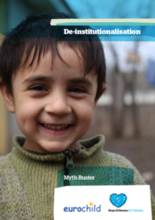Institutions are often referred to as ‘orphanages’, but the term is misleading: in reality, the broad majority of children in institutions in Europe still have one or even both parents alive. For many, separation from the birth family could have been prevented with a timely provision of assistance and support. For others, a nurturing environment could be found in the enlarged family, a foster family or a family-like setting.
This briefing paper by Eurochild and Hope and Homes for Children seeks to address some of the key misunderstandings about de-institutionalisation, including what is it, what are ‘institutions’ for children, aren't institutions 'needed' to take care of orphans, 'institutions have improved a lot why close them, and if institutions are closed where do children go?
It explains that de-institutionalisation is not only about closing institutions. Instead the process entails a comprehensive transformation of child protection systems that starts with reinforcing all kinds of family and parent support services, to ensure that separation of a child from his/her family really is a last resort.

